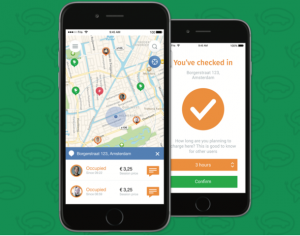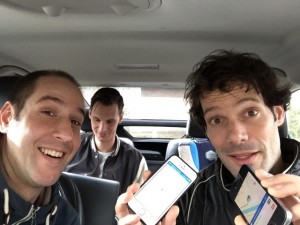Noordwijk, about ten kilometers from Leiden, is the place in the Netherlands for research on space technology. Activities are not confined to research, though. The Business Incubation Centre of the European Space Agency (ESA BIC) houses companies which are trying to transfer technologies from space to other areas of the economy. One of those is Social Charging.
Social Charging is a social network app for Electric Vehicle (EV) users to share charging points efficiently. Social Charging uses geo-information from satellites to detect automatically when EV-users check-in or check-out on charging stations. This information is ‘personalized’, so the system knows which EV user is using the station. Satellite technology also offers users of the app a direct overview of all charging stations around their location at that moment.
EV users can open the Social Charging app when they are looking for charging points around where they are, or need to be. They will see the current status of the charging station: in use or not in use. Thereafter, they can send a personal request-to-charge to the EV-users whose cars are connected to the charging points of their interest. When one of these connected EV-users is willing to make space, a conversation can start by means of a chat. The user will also be facilitated with navigation on how to get there.
Smart Charging
Social charging also uses the underlying automatic check-in and check-out process to add Smart Charging functionality to the app. Co-founder Gertjan Geurts explains: “Most other smart charging technologies just split the available power between the connected EVs. Our technology is splitting the available power more intelligently and user focused. It charges the EVs based on user preferences and users’ need for a full battery at a certain time. For example, if one car needs to be used soon and another car that is also connected to a nearby charging point doesn’t need to be charged quickly, the charging of the first car goes as fast as possible and the charging of the second car slows down.”
Co-founder Gertjan Geurts (on the right)
User preferences
Other advantages are that the technology can maximize the use of local green energy and minimize charging costs. Geurts: “We are busy implementing this. Depending on what the EV-user chooses in his preferences, the charging will be optimized towards speed, maximizing green energy or towards lowering costs. This is possible due to direct connections with energy markets.”
Social Charging joined the ESA BIC in February 2015. Being surrounded by other startups which are using space technology is important for Geurts. “It is very helpful to exchange knowledge with and learn from ESA and other ESA BIC incubatees.” The startup will open the second beta version of the app this week.
Image by Stux @ Pixabay


